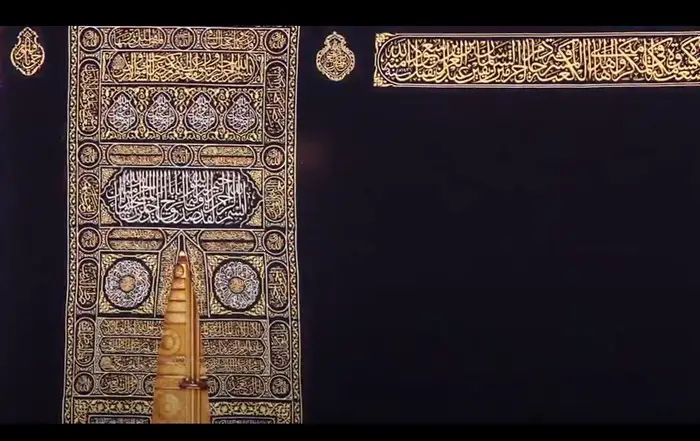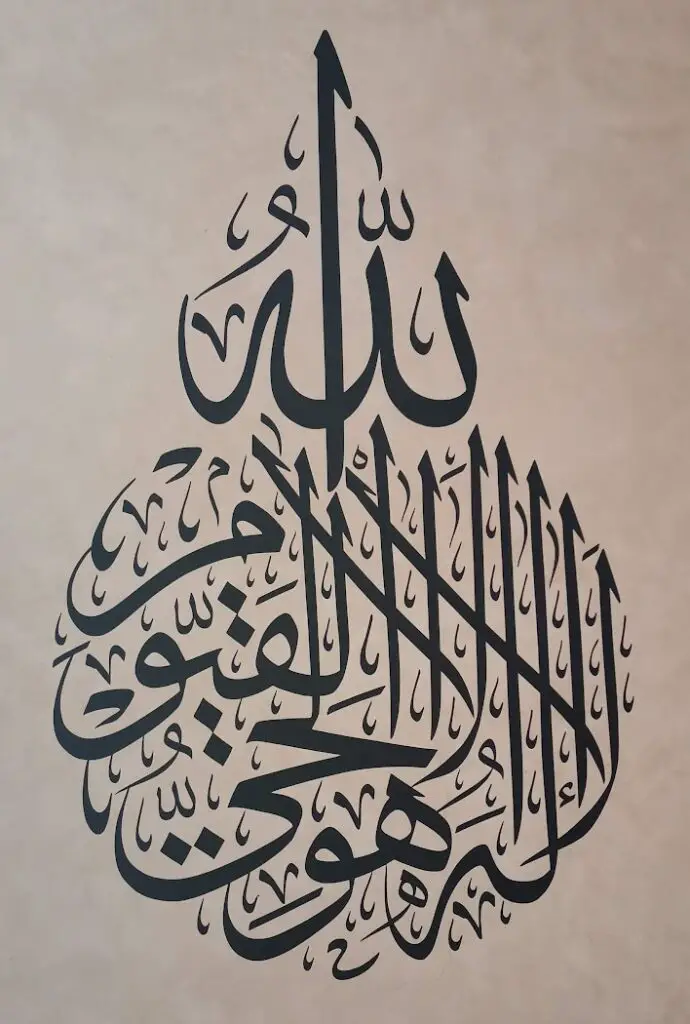In Christianity, God (Allah SWT) is an old, white man with a bushy beard sitting on a throne high in the heavens.
Christians imagine this figure and believe that after their death, they will meet God, and he will judge them for their lives on earth.
On the other hand, in Islam, it is the opposite.
It tells Muslims not to imagine, depict, or even question the existence of God, Allah (SWT). They are not permitted to conceptualize God in any way, shape, or form.
So, I got curious and decided to find out why. I asked religious scholars, consulted Islamic texts, and spoke with other knowledgeable Muslims about their understanding of God Muslims call, Allah (SWT).
Here is what I discovered:

Why Does Islam Forbid Muslims To Imagine Or Depict God Allah (SWT)?
Islam forbids Muslims to imagine or depict Allah (SWT) because it is impossible to do it. The creator is nothing like creation, with no form, substance, or resemblance to anything in the living universe. Allah (SWT) is infinitely more significant and far beyond human imagination or conception.
On the surface, the explicit prohibition of the physical and mental picturing of God (Allah SWT) seems mean and unfair.
After all, human beings need to develop a close personal relationship with their divine creator.
Since we cannot see God, then visualizing or imagining him is the easiest and best way to achieve that closeness.
However, Islam disagrees.
How Should Muslims Get To Know God, Allah (SWT)?
Muslims can know God, Allah (SWT), not by visualizing and making mental pictures but by recognizing our innate belief in God (Fitrah), contemplating creation in the living universe, and correctly understanding Allah’s (SWT) true essence, (Dhat), attributes (Sifaat) and his divine names (Al Asmaa Al Husna).
This article answers the question of how Muslims should know Allah (SWT) in five brief sections.
Five Ways To Know God, Allah (SWT) Other Than By Depiction And Imagination
Table of Contents
Click on the link to jump to the section and the arrow to return.
- Depicting Or Imagining Allah (SWT) Is Impossible To Get Right
- Humans Are Born With An Innate, Hardwired Belief (Fitrah) In Allah (SWT)
- Human Beings & Created Things Do Not Create Themselves
- Belief In Allah’s (SWT) Divine Essence (Dhat), Attributes (Sifaat), And Names (Al Asmaa Al Husna)
- Four Mistakes Invalidating Correct Belief And Understanding Of Allah (SWT)
1. Depicting Or Imagining Allah (SWT) Is Impossible To Get Right

It is pointless for Muslims to depict, imagine, or question the existence of Allah (SWT) because it is an impossible task.
Islam says God, Allah (SWT), is far beyond human comprehension. Whatever way we imagine Allah (SWT) to be, the truth is that God is infinitely greater and more significant.
The nature (Dhat) and appearance of Allah (SWT) are beyond human imagination or our ability to conceive. We, the creation, cannot pretend to know the creator.
Islam says there is nothing in this material world that is like Allah (SWT). Nothing is equal, comparable, or can match Him.
Allah (SWT) does not resemble anything in the living universe.
A: Quranic Proof That Humans Cannot Visualize And Understand God, Allah (SWT)
In the Quran, Surah Ash Shuraa 42:11 , Allah (SWT) declares that there is ‘nothing like Him (Allah) and that He is all-hearing and all-knowing.
, Allah (SWT) declares that there is ‘nothing like Him (Allah) and that He is all-hearing and all-knowing.
Likewise, Allah (SWT) declares in Surah Al-Anan 6:103 that no normal vision can comprehend Allah (SWT), yet He, God, understands everything and is subtle and all-aware.
that no normal vision can comprehend Allah (SWT), yet He, God, understands everything and is subtle and all-aware.
B: Hadith Proving Humans Cannot Understand God, Allah (SWT)
A book called Sahih Al Jami and the writings of Shaikh Al Albani report Prophet Mohammed (SAW) saying:
‘Ponder on the creation, and do not ponder on the Creator, God. You surely cannot do so.’
Al-Jami Al-Ṣaghir 6219
2. Humans Are Born With An Innate, Hardwired Belief (Fitrah) In Allah (SWT)
Belief in Allah (SWT) is innate and hardwired in humans. This belief is called Fitrah.
Islam maintains that humans are born pure with a natural or innate disposition to recognize, love, and worship God, Allah SWT.
It is a recognition of the oneness of Allah (Tawheed).
Allah (SWT) has blessed every human being with the natural ability to understand and acknowledge the oneness (Tawheed) of His existence.
A: Quranic Proof That Allah (SWT) Creates Humans With Pure Intention Fitrah
The proof that humans are born with pure intention (Fitrah) is in the Quran, Surah Ar-Rum 30:30 .
.
In the Surah, Allah (SWT) urges human beings to turn their faces towards the truth (Haneef) and the Fitrah, which He, Allah, has created in them. Surah Ar-Rum 30:30 .
.
However, years of social conditioning and erroneous beliefs cause this innate ability to become concealed, hidden, and buried deep inside.
Human beings grow up neglecting and forgetting all about their pure intention or Fitrah.
B: Knowing Allah (SWT) Is Deep In The Soul Of Humanity, But It Gets Obscured
The truth about the existence of God, Allah (SWT), can be felt deeply in the human soul. However, forgetfulness, outright ignorance, and disobedience cause humans to deny the knowledge of God that resonates innately deep inside the soul. (MF)
Covering up the truth about God, wilfully or otherwise, is disbelief (Kufr), and a person is a disbeliever (Kaffar) in Islam.
C: Hadith Proving Humans Are Born In A State Of Fitrah
Abu Hurayrah records Prophet Mohammed (SAW) saying:
Every child is born upon the Fitrah. Only his parents turn him into a Jew, a Christian, or a Zoroastrian. Just as animals are born having complete bodies, do you see any of them having a cut-off nose after birth?
Saheeh Muslim 2659a– Book 46 Hadith 40 / Book 33 Hadith 642
D: In Life Or Death Situations, People Call out To God, Allah (SWT) For Help
When you surprise someone unexpectedly, the sudden shock causes them to call out, Oh my God, you scared me to death.
Their response is spontaneous and unconscious. In danger, atheists never call out to parents or friends but to God, Allah (SWT).
The same is true for everyone in life-and-death situations. If boats sink into the ocean, airplanes fall out of the sky, or even when someone threatens your life, people panic and unconsciously shout in terror, Oh my God, help us.
E: Quranic Proof That Allah (SWT) Helps The Disbelievers In Mortal Danger
When disbelievers (Kaffar) face mortal danger, they immediately remember and call out to God, Allah (SWT), for assistance.
The people or things they usually rely on suddenly vanish, and only God, Allah (SWT), remains.
Allah (SWT) says in the Quran, Surah Al Israh 17:67 :
:
When lost at sea, everything and everyone else disappears from the hearts and minds of the disbelievers, except God.
However, when God, Allah (SWT) saves and returns them to land, these same disbelievers turn away from remembering the oneness of God (Tawheed). Even then, they are so ungrateful.’
Quran, Surah Al Israh 17:67
3. Human Beings & Created Things Do Not Create Themselves

Everything created has a creator. People and things cannot make themselves. It is not logical to assume that life, our world, and the universe are self-created or happen by chance.
For example, when we buy a complex device such as a smartphone, we accept that a team designed it and a factory manufactured it.
No one can reasonably argue the phone made itself or appeared by chance.
Similarly, when we see footprints in the sand, we can logically assume that someone walked over the sand.
No one would deny that the footprints magically appeared by themselves and that a person had not walked there.
Likewise, everything in our world and the universe cannot come from nothing. There has to be an intelligent creator.
When we witness life and creation, we automatically acknowledge there MUST be a creator God, Allah (SWT), an infinite force or power capable of producing it all.
A: Quranic Proof That Allah (SWT) Is The Creator Of Everything
In the Quran, Allah (SWT) Surah Al-Tur challenges and berates nonbelievers and idol worshippers for denying God, Allah (SWT), and the pleasures of the hereafter.
challenges and berates nonbelievers and idol worshippers for denying God, Allah (SWT), and the pleasures of the hereafter.
In the same Surah, 52:35 , Allah (SWT) asks disbelievers if nothing created them or had created themselves.
, Allah (SWT) asks disbelievers if nothing created them or had created themselves.
Of course, both statements are untrue. God, Allah (SWT), created humans from nothing and brought them into existence.
In the next Ayat, 52:36 , Allah (SWT) asks disbelievers whether they created the world and the heavens and reply they are not sure.
, Allah (SWT) asks disbelievers whether they created the world and the heavens and reply they are not sure.
Nonbelievers can never explain the creation of the world and the heavens.
B: Contemplating The Abundance Of Life On Earth, The Stars, And Planets
To get to know Allah (SWT), Muslims, should not depict and imagine God, BUT ponder and think about the creation.
Life on this planet is massively abundant.
There are 8 billion human beings, with many more land and sea animals, birds, insects, and microscopic creatures.
An abundance of trees, plants, and freshwater support all life.
Beyond the earth and the solar system are billions of planets and stars full of life stretching to infinity.
Commenting on Surah Al Baqarah Verse 22 , the scholar Ibn Kathir says of life and the natural world,
, the scholar Ibn Kathir says of life and the natural world,
‘Whoever thinks about this will realize that these facts testify to the existence of the Creator, His perfect ability, wisdom, mercy, kindness, generosity, and His overall compassion for His creation. No deity is worthy of worship except Allah, nor is there a Lord besides Him, we rely on and to Him, we turn in repentance.’
Ibn Kathir Commentary(Arabic) on Surah Al Baqarah 2:22
4. Belief In Allah’s (SWT) Divine Essence (Dhat), Attributes (Sifaat), And Names (Al Asmaa Al Husna)


We know Muslims cannot depict, imagine, or question the existence of Allah (SWT).
We cannot precisely because Allah (SWT) says that even if we wanted to, ‘no ordinary vision can comprehend Allah (SWT), yet, He, God comprehends all visions and is subtle and all-aware.’ Surah Al-An’an 6:103 .
.
However, Muslims desire a deep personal relationship with God, Allah (SWT). They can not comprehend Allah (SWT) but can form a relationship with Him by meditating and reflecting on God, Allah’s essence (Dhat), attributes (Sifaat), and beautiful names (Al Asmaa Al Husna)
A: What Is the Essence (Dhat) of Allah?
The six characteristics are exclusive, eternal, and perfect to God, Allah (SWT), and are aspects or ways to describe and comprehend the essential nature of God to make it easy to understand Him.
Allah (SWT) describes Himself using these traits. Human beings (the creation) do not possess them except in a limited sense.
For example, people feel mercy (Rahma), but Allah’s mercy is much greater and has no comparison to ours.
- The Existence (Wujood)
- Preeternal (Qidam)
- Ever-lasting (Baqa)
- Unlike The Creation (Mukhalifah Lil Al Hawadith)
- Self Subsists (Qiyam Bi Nafsihi)
- Is One (Wahdaniyyah)
The Existence (Wujood)
Since we know the creation exists, the Creator, God, must too. Allah (SWT) must exist in all periods, places, and possible universes.
Preeternal (Qidam)
God, Allah (SWT), was never born but always existed, even before time, and is not subject to it.
If time did not exist, Allah (SWT) would continue unchanged.
Ever-lasting (Baqa)
God, Allah (SWT), has always existed and will always be.
Unlike The Creation (Mukhalifah Lil Al Hawadith)
God, Allah (SWT), bears no resemblance to His creation, is perfect, and our existence which came from Him also depends on Him.
The creation is imperfect, but Allah (SWT) is free of imperfections. Allah (SWT) can never be anything like the creation, nor are created things able to imagine or to know God. (MF)
Self Subsists (Qiyam Bi Nafsihi)
God, Allah (SWT), exists independently of anything else. He needs no creator, no place or time, and exists alone (As Samad).
Is One (Wahdaniyyah)
God, Allah (SWT) is one, with no second, no similar, and without division.
B: What Are Allah’s Attributes (Sifaat)?
The following eight characteristics or attributes are exclusive to God, Allah (SWT). These are aspects or ways to describe and comprehend the inherent features of the qualities of God.
They make it easy and help us to comprehend Him. Ordinary human beings (the creation) do not possess these features except in a limited sense.
However, understanding them allows us to develop a relationship with Allah (SWT) and engender love and a deep connection.
- Life (Hayah)
- Power (Qudrah)
- Knowledge (Ilm)
- Will (Iradha)
Life (Hayah)
God, Allah (SWT), is life and never dies, and we trust in the One who lives eternally. Al Furqan 25: 58
Power (Qudrah)
God, Allah (SWT), is all-powerful. Life, creation, and the universe testify to the power of Allah (SWT), who has dominion over EVERYTHING. Surah An-Nur 24:45
Knowledge (Ilm)
God, Allah (SWT), is aware of and knows EVERYTHING, the largest and the tiniest detail. He knows all that exists, that which will come into existence, and everything that has never existed.
In Surah Al An’am 6:59 , Allah (SWT) informs us that
, Allah (SWT) informs us that
‘the keys of the unseen are with Allah (SWT), and He knows everything on land and sea. Not a leaf falls, but Allah (SWT) knows about it. He knows and records even the smallest grain buried deep in the earth.
Surah Al An’am 6:59
Will (Iradha)
God, Allah (SWT), does what he wills. Whatever Allah (SWT) desires will become and is absolute. In pre-eternity, he willed what was and what will be.
No one can change, stop or delay his will.
- Hearing (Samaa)
- Seeing (Al Basr)
- Speech (Kalam)
- Originality (Takwin)
Hearing (Samaa)
God, Allah (SWT), has no ears yet He hears all sounds. He can even hear the sound of a falling leaf in the forest where no one is present.
Seeing (Al Basr)
God, Allah (SWT), sees all shapes, colors, and forms, even without eyes. Allah (SWT) is THE hearing and THE seeing. Surah Al Ghafir 40-20
Speech (Kalam)
God, Allah (SWT), communicates but has no voice. The Holy Quran is the ultimate speech (Kalam) to humanity.
In the Quran, Allah (SWT) spoke to Prophet Musa (AS), informing him he would not be able to see Allah (SWT).
In the following verse, Prophet Musa (AS) tries his best to see Allah, but He (SWT) levels a mountain causing Prophet Musa to fall unconscious. Surah Al-Araf 7:143
Originality (Takwin)
God, Allah (SWT), creates something from nothing. By His power and will, that which never existed now exists. Allah (SWT) says, ‘be’ and it is. Al Baqarah 2:117
C: What Are Allah’s Names (Al Asmaa Al Husna)?
Another way to increase belief and get close to God, Allah (SWT), is to learn and memorize his names (Al Asmaa Al Husna). (MF)
They are the beautiful names for Allah (SWT) that make him perfect, traditionally known as the 99 names of Allah (SWT).
In Surah Al-Araf 7:180 , Allah (SWT) urges us to invoke Him by using his names and to ignore the people who misuse them.
, Allah (SWT) urges us to invoke Him by using his names and to ignore the people who misuse them.
Abu Hurayah cites our beloved Prophet Mohammed (SAW) saying of the names of Allah (Al Asmaa Al Husna):
‘Allah (SWT) has ninety-nine Names, a hundred less one. Whoever counts (and preserves) these name will enter Paradise. Allah is one (Al-Witr) and loves odd numbers of things.’
Sahih Muslim 2677a, Book 48:5 & Book 35:6475
Islam obliges Muslims to believe in Allah’s (SWT) divine names.  The nature and meaning of Allah’s 99 names are extensive and go beyond the scope of this article.
The nature and meaning of Allah’s 99 names are extensive and go beyond the scope of this article.
However, you can read the names of Allah (Al Asmaa Al Husna) in the poster above or listen to them recited in the YouTube video below.
In addition, read this special invocational prayer when overcome by sadness or grief. Prophet Mohammed (SAW) obliges anyone who hears it to learn and memorize it.
when overcome by sadness or grief. Prophet Mohammed (SAW) obliges anyone who hears it to learn and memorize it.
5. Four Mistakes Invalidating Correct Belief And Understanding Of Allah (SWT)
Following contemplation of the divine essence (Dhat), attributes (Sifaat), and names (Al Asmaa Al Husnaa) Allah (SWT), Muslims may only arrive at a proper understanding, closeness, and belief in God if they avoid making the following four mistakes.
The four mistakes are
- Distortion (Tahreef)
- Denial (Tateel)
- Likening Allah To His Creation (Tamtheel)
- Asking Or Discussing How (Takyeef)
The four mistakes are ways human beings oppose the nature and attributes of Allah (SWT) through twisting meaning, denying the truth, and unnecessary lines of questioning.
Failing to avoid these means you have not achieved the correct beliefs and understanding. So, to properly understand God, Allah (SWT), we do our best to avoid the following:
Distortion (Tahreef)
Distortion is when we distort or change the meanings of the Holy Quran and ways of Prophet Mohammed’s (SAW) Sunnah regarding Allah’s beautiful names.
Denial (Tateel)
Denial means claiming or maintaining that God, Allah (SWT), does not possess his beautiful names, divine essence, or attributes.
Likening Allah To His Creation (Tamtheel)
Likening Allah is suggesting that Allah (SWT) resembles his creation in any way whatsoever. For example, Muslims cannot say Allah’s hands or hearing are like a man’s. (MF)
Asking Or Discussing How (Takyeef)
Asking or discussing means speculating about or questioning Allah’s beautiful names, essence, or attributes.
Allah (SWT) will compel them to prostrate to Him, judge each small measure of faith, and despite our ignorance, demonstrate His insight and knowledge of ‘what is before them (the souls) and what will be after them.’ Surah Al Taha 20:110
Conclusion

In summary, Islam does not permit Muslims to conceptualize God, Allah (SWT), in any way. Allah (SWT) does not resemble anything or anyone in the living universe.
He is beyond human conception.
Humans are not capable of imagining and conceptualizing Him. The creation cannot know the creator. However, human beings have a deep need to connect and establish a close relationship with Him.
We first achieve this by accepting the impossibility of knowing and conceiving God (SWT).
Then, we should understand that created things do create themselves. After that, we can wonder at the marvels of the living world and the universe.
Later, we must reflect on the divine essence (Dhat), attributes (Sifaat), and names (Asmaa) of Allah (SWT) to help develop a close relationship with Him.
Finally, we should avoid the four common mistakes that invalidate a correct belief and conception of Allah (SWT).
Related Questions
Are Muslims Prohibited To Make Images Of Prophet Mohammed (SAW)? Yes, creating images of likenesses of the Prophet of Islam or any other prophets is strictly prohibited in Islam. Images and representations can cause people to worship and idolize them. We know about Prophet Mohammed’s appearance from verbal descriptions.
He was the most handsome man I had ever seen. He had a beautiful face, a radiant smile, and a gentle disposition. He was always kind and compassionate, and he loved to help others.
Aisha- the youngest wife to Prophet Mohammed
‘he Prophet was neither too tall nor too short. He had a medium build, a ruddy complexion, and large, black eyes. His hair was neither curly nor straight but a mixture of the two. He had a broad forehead and a long beard. His teeth were white and even.
Ali ibn Abi Talib, the Prophet Mohammed ’s (SAW) cousin, and son-in-law
Why Do Muslims Use The Term ‘Allah’ To Refer To God? In Arabic, the word Allah means God. It refers to His oneness and the only acceptable name for God in Islam. The term originates from the pagan pre-Islamic usage of a god called Il, El, or Eloah. The Hebrew Bible and Christian Old Testament contain the last two names.
References And Useful Links
There Is Nothing Like Him, For He Alone All-Hearing And All-Seeing – An-Nur 42:11
– An-Nur 42:11
What is Fitra? – Wikipedia
– Wikipedia
We Have Certainly Created Man In The Best Of Stature – Quran At-Tin 95:4
– Quran At-Tin 95:4
Direct Yourself Toward The Truth (Hanifa), Adhere To Fiṭrah Of Allah – Quran Ar-Rum 30:30
– Quran Ar-Rum 30:30
“Am I Not Your Lord?” They said, “Yes, We Have Testified.” – Quran Al Araf 7:172
Meaning of Every Child Is Born In A State Of Fitrah – Saheeh Muslim
– Saheeh Muslim
Evidence Only Allah Is The Creator Of Life – Islam Q & A
– Islam Q & A
Evidence For The Existence Of The Creator In Islam – Abu Amin Elias
– Abu Amin Elias
Faced With Mortal Danger At Sea, Disbelievers Cry Out To God – Surah Al Israh 17:67
– Surah Al Israh 17:67
Admonitions About Denying God, Allah (SWT). And The Hereafter – Surah At-Tur 52
– Surah At-Tur 52
Allah (SWT) Made Earth A Bed, Sky A Ceiling Rain To Produce Fruit To Enjoy – Surah Al Baqarah 2:22
– Surah Al Baqarah 2:22
Ibn Kathir Commentary On Al Baqarah 22: 22 Nature, Creation, & Creator God, Allah (SWT) – Quran KSU
– Quran KSU
Ponder The Creation, Not The Creator- You Do Not Have The Ability – Al-Jami Al-Ṣaghir 6219
– Al-Jami Al-Ṣaghir 6219
Put Your Trust In The One Who Lives Eternally – Surah Al-Nur 24:45
– Surah Al-Nur 24:45
Allah (SWT) Is THE Hearing And THE Seeing – Surah Al Ghafir 40-20
Allah (SWT) Simply Says, ‘Be’ And It Is – Al Baqarah 2:117
Allah (SWT) Urges Muslims Iinvoke Him By Using His Names – Surah Al-Araf 7:180
– Surah Al-Araf 7:180
When Muslims Recite Allah’s (SWT) 99 Names, They Will Enter Paradise – Sahih Muslim 2677a
– Sahih Muslim 2677a



